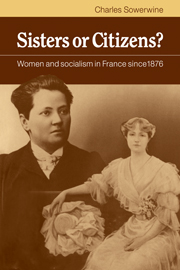Book contents
- Frontmatter
- Contents
- Preface
- Abbreviations of organisations
- Bibliographical abbreviations
- Introduction
- Part I Feminism and socialism 1876–1900
- 1 Women and the beginnings of the socialist movement 1876–82
- 2 Socialist parties in search of women 1882–99
- 3 Feminists in search of a mass base: the rise and fall of social feminism 1889–1900
- Part II Origins of the socialist women's movement 1899–1914
- Part III Development and decline of the socialist women's movement 1914–79
- Conclusion
- Appendix 1 The Second International and the woman question 1889–1904
- Appendix 2 French socialist women in figures
- Appendix 3 Elisabeth Renaud and the Cambier affair
- Notes
- Bibliography
- Index
3 - Feminists in search of a mass base: the rise and fall of social feminism 1889–1900
Published online by Cambridge University Press: 07 October 2011
- Frontmatter
- Contents
- Preface
- Abbreviations of organisations
- Bibliographical abbreviations
- Introduction
- Part I Feminism and socialism 1876–1900
- 1 Women and the beginnings of the socialist movement 1876–82
- 2 Socialist parties in search of women 1882–99
- 3 Feminists in search of a mass base: the rise and fall of social feminism 1889–1900
- Part II Origins of the socialist women's movement 1899–1914
- Part III Development and decline of the socialist women's movement 1914–79
- Conclusion
- Appendix 1 The Second International and the woman question 1889–1904
- Appendix 2 French socialist women in figures
- Appendix 3 Elisabeth Renaud and the Cambier affair
- Notes
- Bibliography
- Index
Summary
‘We are accused, indeed, of never concerning ourselves with the misery of working women [italics orig.] and of concerning ourselves only with the woman voter, lawyer or doctor’, complained Maria Pognon, president of the Ligue Française pour le Droit des Femmes. Pognon was one of those who sought to correct this situation, realising that feminism could not become an effective force unless it reached beyond the narrow circle of bourgeois women to whom it had so far been confined. Earlier, during the 1890s, women like Eugénie Potonié-Pierre also endeavoured to expand the horizons of feminism, but without perceiving the need to enlarge its base: thinking in humanitarian rather than political terms, they tried simply to incorporate their social concern into feminism, much as they had attempted in the 1880s to bring their feminism into socialism. Their ‘social feminism’ (to coin a phrase not used at the time) paved the way for more conscious efforts to bring working-class women into the feminist movement. The failure of these efforts in turn left the field clear for an authentically working-class women's movement within socialism.
The mainstream of feminism was still timid and legalistic. When it manifested itself in two congresses held in 1889, after more than a decade of dormancy, it reflected the conservatism of its social base. One of these congresses had semi-official sanction within the framework of the Exposition of 1889 and was organised by a committee which included some of the wealthiest families and best-known politicians of France.
- Type
- Chapter
- Information
- Sisters or Citizens?Women and Socialism in France since 1876, pp. 67 - 80Publisher: Cambridge University PressPrint publication year: 1982



